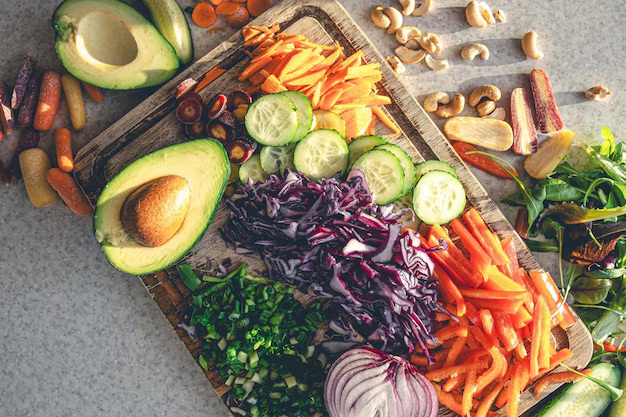10 Best Vegetables for Constipation & Gut Health Benefits
Constipation is a common digestive issue affecting millions of people worldwide. Characterized by infrequent or difficult bowel movements, it can lead to discomfort, bloating, and even more serious digestive problems if left unaddressed.
One of the most effective, natural ways to combat constipation and promote gut health is through diet—specifically by including the right vegetables. Vegetables are packed with dietary fiber, essential vitamins, minerals, and compounds that support a healthy gut microbiome and smooth digestive function.
In this comprehensive guide, we’ll explore 10 healthy vegetables for constipation and gut health, highlighting their benefits, nutritional profiles, and tips on how to incorporate them into your daily meals. Whether you’re struggling with occasional constipation or want to maintain optimal digestive wellness, these vegetables are excellent allies on your journey to better gut health.

Why Vegetables Are Key to Gut Health and Constipation Relief
Before diving into the list, it’s important to understand why vegetables are so effective in promoting gut health and alleviating constipation.
- High in Dietary Fiber: Fiber adds bulk to stool and helps it move more easily through the intestines. It can be soluble (which dissolves in water and helps soften stool) or insoluble (which adds bulk and speeds up transit time).
- Rich in Prebiotics: Many vegetables contain prebiotics—compounds that feed beneficial gut bacteria, supporting a healthy microbiome.
- Hydration: Vegetables with high water content aid hydration, which is crucial for softening stool.
- Nutrient Dense: Vitamins and minerals in vegetables (like magnesium and vitamin C) support muscle function in the digestive tract and overall gut integrity.
- Low in Calories: Vegetables allow you to eat large volumes without excessive calories, which helps maintain a healthy weight—a factor linked to better digestion.
1. Spinach
Spinach is a powerhouse vegetable packed with both soluble and insoluble fiber, making it one of the best choices for constipation relief. Just one cup of cooked spinach provides about 4 grams of fiber, contributing significantly to your daily fiber needs.
Benefits for Gut Health:
- Contains magnesium, a mineral that helps relax intestinal muscles and draw water into the intestines, softening stools.
- Rich in antioxidants and anti-inflammatory compounds that promote overall gut health.
- Spinach contains chlorophyll, which may help detoxify the digestive tract.
How to Use:
- Add fresh spinach to smoothies or salads.
- Sauté spinach lightly with garlic and olive oil for a quick side dish.
- Incorporate spinach into soups, stews, or omelets.
2. Broccoli
Broccoli is another fiber-rich vegetable that supports gut motility and health. It contains both soluble and insoluble fibers, plus sulforaphane, a compound that may protect gut lining from damage.
Benefits for Gut Health:
- High in insoluble fiber, which adds bulk to stool and helps it move quickly through the digestive system.
- Acts as a prebiotic, feeding beneficial gut bacteria.
- Contains vitamin C and other antioxidants to reduce gut inflammation.
How to Use:
- Steam broccoli lightly to preserve nutrients.
- Add to stir-fries, pasta dishes, or salads.
- Blend steamed broccoli into creamy soups for added fiber.
3. Carrots
Carrots are crunchy and naturally sweet, making them a popular vegetable for increasing fiber intake. They are rich in soluble fiber, particularly pectin, which softens stool and supports healthy gut bacteria.
Benefits for Gut Health:
- Pectin in carrots slows digestion, allowing for better nutrient absorption and maintaining gut health.
- Contains beta-carotene, an antioxidant that supports mucosal lining in the digestive tract.
- Carrots also promote regular bowel movements by increasing stool bulk.
How to Use:
- Eat raw as a snack or in salads.
- Roast carrots with herbs for a flavorful side.
- Add grated carrots to muffins or pancakes for extra fiber.
4. Brussels Sprouts
Brussels sprouts, often overlooked, are excellent for digestion due to their high fiber content and prebiotic properties.
Benefits for Gut Health:
- Contains glucosinolates, which help detoxify the gut.
- Rich in both soluble and insoluble fiber.
- Acts as a prebiotic, fostering the growth of good bacteria.
How to Use:
- Roast Brussels sprouts with olive oil and sea salt.
- Shred raw Brussels sprouts into salads or slaws.
- Add to vegetable stir-fries or pasta dishes.
5. Sweet Potatoes
Sweet potatoes are not only delicious but also a great source of fiber and nutrients like potassium and magnesium, which aid digestion.
Benefits for Gut Health:
- High in soluble fiber, which helps soften stool.
- Contains resistant starch, a type of fiber that acts as a prebiotic.
- Magnesium in sweet potatoes helps regulate bowel movements.
How to Use:
- Bake or roast sweet potatoes as a side dish.
- Mash with a bit of olive oil and herbs.
- Add cubes to soups or stews.
6. Kale
Kale is a nutrient-dense leafy green that’s high in fiber and antioxidants. It promotes gut motility and supports a healthy microbiome.
Benefits for Gut Health:
- Contains insoluble fiber to add bulk to stool.
- High in vitamin C and vitamin K, supporting tissue repair and immune function.
- Acts as a prebiotic.
How to Use:
- Add kale to smoothies or salads.
- Massage raw kale leaves with lemon juice and olive oil to make them tender.
- Use kale as a base for vegetable soups or stews.
7. Zucchini
Zucchini is a low-calorie vegetable with a high water content and moderate fiber level, helping to hydrate and bulk up stool.
Benefits for Gut Health:
- Contains both soluble and insoluble fiber.
- High water content aids stool softness.
- Contains antioxidants that reduce inflammation in the gut.
How to Use:
- Spiralize zucchini as a pasta substitute.
- Grill or roast zucchini slices.
- Add diced zucchini to soups, stews, or casseroles.
8. Beets
Beets are rich in fiber and betaine, which support liver function and digestion.
Benefits for Gut Health:
- High in insoluble fiber to promote regular bowel movements.
- Betaines support detoxification, improving digestive tract health.
- Natural nitrates in beets improve blood flow to digestive organs.
How to Use:
- Roast beets and add them to salads.
- Juice beets with other vegetables.
- Steam or boil and serve as a side dish.
9. Cabbage
Cabbage is a cruciferous vegetable loaded with fiber and compounds that aid digestion and gut detoxification.
Benefits for Gut Health:
- High in insoluble fiber to speed up digestion.
- Contains glucosinolates, which promote healthy gut lining.
- Acts as a prebiotic to feed beneficial bacteria.
How to Use:
- Use raw cabbage in coleslaws.
- Add to soups or stews.
- Ferment to make probiotic-rich sauerkraut.
10. Asparagus
Asparagus is a natural diuretic and a rich source of inulin, a prebiotic fiber that nourishes gut bacteria.
Benefits for Gut Health:
- High in inulin, promoting beneficial gut bacteria.
- Contains both soluble and insoluble fiber.
- Acts as a natural diuretic, aiding digestion and reducing bloating.
How to Use:
- Grill or roast asparagus with olive oil.
- Add asparagus tips to salads or pasta.
- Steam and serve as a side vegetable.
Tips for Incorporating These Vegetables Into Your Diet

- Eat a Variety: Aim to include several different fiber-rich vegetables daily to get a broad range of nutrients.
- Stay Hydrated: Fiber works best with adequate water intake, so drink plenty of fluids.
- Cook Lightly: Overcooking vegetables can reduce their fiber and nutrient content; steaming or roasting is preferred.
- Gradually Increase Fiber: To avoid gas or bloating, increase fiber intake slowly over weeks.
- Combine with Probiotics: Pair fiber-rich vegetables with probiotic foods like yogurt or fermented vegetables to boost gut health.
Conclusion
Maintaining gut health and preventing constipation is critical for overall wellbeing, and the first step often lies on your plate.
Including these 10 healthy vegetables for constipation and gut health in your diet can dramatically improve your digestion, increase nutrient absorption, and promote a thriving gut microbiome.
From leafy greens like spinach and kale to root vegetables like carrots and beets, these natural foods are some of the best, most effective remedies for digestive wellness.
With consistent incorporation into your meals and a balanced lifestyle, these vegetables can help you say goodbye to constipation and hello to a healthier gut.
References
- https://www.sciencedirect.com/science/article/abs/pii/S0899900713004066
- https://www.nature.com/articles/nature18846
- https://journals.lww.com/nutritiontodayonline/Abstract/2015/03000/Evidence_Based_Approach_to_Fiber_Supplements_and.8.aspx
- https://www.mdpi.com/2072-6643/2/13/1366
- https://academic.oup.com/nutritionreviews/article/67/4/188/1913767